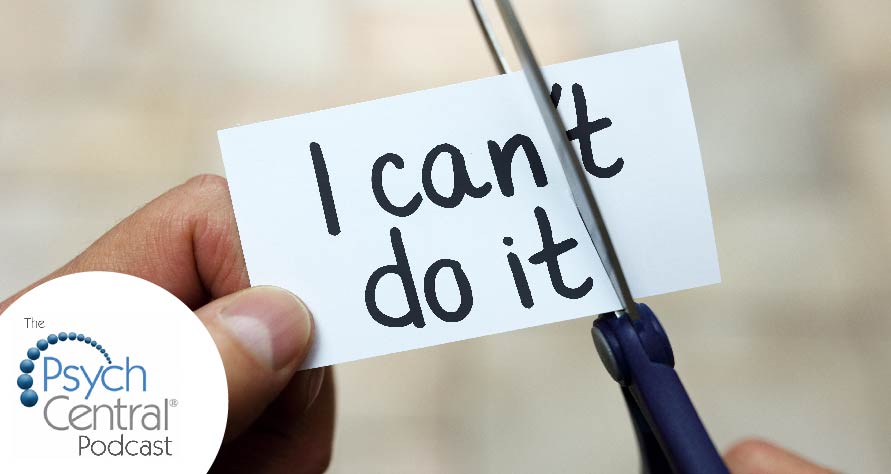“I’m such a loser. I can’t believe I just said that.” Sound familiar? Most of us live with a constant inner critic telling us everything we’ve done wrong. Why is this? And how can we fix it? In today’s show, author Kevin Stacey helps us reign in our brain’s natural negativity bias. Click on the player below to listen now!
SUBSCRIBE & REVIEW
Guest information for ‘Kevin Stacey- Navigate Life’s Noise’ Podcast Episode

Kevin Stacey, MBA, is an effectiveness expert, author, and former brain imaging specialist who removes barriers to performance, boosts resiliency, and accelerates results- no matter what. He combines his military background, management training, experience as a healthcare clinician, and successful manager at the nation’s largest managed care company to be a catalyst for workplace improvement. After starting his medical career at Walter Reed Army Medical Center, Kevin now brings the principals of neuroscience into the modern business world to effect change from the inside-out.
Kevin has a proven record of helping organizations enhance their effectiveness and bottom line. From IBM, The New York Times, Ford Motor Company, JP Morgan Chase, Pharmacia, Bayer, Goody Hair Care, United Technologies, Boeing, and Sara Lee, he has worked with the world’s best and brightest and studied the effects of self-created problems in organizations and individuals along with the most effective antidotes to combat it. His services help these and other clients achieve increased performance, sales, higher employee retention, greater job satisfaction, and improved service quality. He is CEO and founder of TrainRight, Inc., with a highly-skilled team of facilitators offering programs globally.
Computer Generated Transcript for ‘Kevin Stacey- Navigate Life’s Noise’ Episode
Editor’s Note: Please be mindful that this transcript has been computer generated and therefore may contain inaccuracies and grammar errors. Thank you.
Announcer: You’re listening to the Psych Central Podcast, where guest experts in the field of psychology and mental health share thought-provoking information using plain, everyday language. Here’s your host, Gabe Howard.
Gabe Howard: Hello, everyone, and welcome to this week’s episode of the Psych Central Podcast. Calling into the show today, we have Kevin Stacey, MBA. He’s an effectiveness expert, author and former brain imaging specialist who removes barriers to performance, boosts resiliency and accelerates results, no matter what. He’s the author of MindRight: Navigate the Noise – How to deal with your internal fake news. Kevin, welcome to the show.
Kevin Stacey, MBA: Thank you, Gabe, so much for having me.
Gabe Howard: Kevin, I’m really glad you’re on the show, because I think a lot of us get bogged down in our own negative self talk. Can you give us some sort of an explanation or a definition of negative self talk?
Kevin Stacey, MBA: Sure, Gabe, you know, it’s so frustrating for people and I’ve seen some stuff lately, they think the US, we’re considered the most unhappiest kind of wealthy nation in the world. I think they’re much happier out there in Finland or some of those European countries. But, you know, with the negative self talk it is just this background kind of chatter that goes on, it’s almost like death by a thousand paper cuts, it needles with it. And so many people just aren’t even aware that they’re doing it. It’s just that’s how they grew up. They’re just so used to this background, automatic negative thoughts. The brain is very negative, unfortunately. Our brains have a negativity bias and the brain just really wants to speculate on what’s going wrong. What could go wrong? What might be wrong with this picture? How I might be in danger. And it’s just inner criticism, self-criticism, inner critic, kind of out of control, this is what I mean by internal fake news. It’s kind of news that appears real. But it’s really just fake because it’s our brain trying to protect us from physical danger. And it’s really just silly and outdated job.
Gabe Howard: One of the things that I think of when I hear negative self talk is a conversation that I have with my wife about once a week.
Kevin Stacey, MBA: Right.
Gabe Howard: I say to her, oh, my God, you’re so positive. You’re basically Pollyanna. And she says to me, well, you’re so negative. And I say, I’m not negative. I’m a realist.
Kevin Stacey, MBA: So I guess that’s what they mean by opposites attract.
Gabe Howard: I think it is, but in my mind, I’m not being negative, I’m being realistic. The negative things I find aren’t fake. They are real. I’m worried about paying bills or worried about work. But of course, my wife is pointing this out because I imagine it’s unbearable to live with somebody who is just constantly walking around saying, hey, the plumbing could leak. Do we have insurance?
Kevin Stacey, MBA: Yeah, I mean, it can be tough. People can bring you down, but good to be prepared. It’s good to have financial plans. It’s good to have backup plans. But I just think at some point people have to just ask themselves, how would I like things to go? How would they like things to be? A lot of us are just such experts in our problems or perceived problems or speculating over problems that we’re just experts not in solving them but just describing them to other people.
Gabe Howard: That’s a really good point that you brought up there, that we’re experts in describing them, but we’re not experts in fixing them.
Kevin Stacey, MBA: Well, just the analysis paralysis, the rumination is what psychologists call it, just the getting stuck in the problem and kind of looping around and looping around. And some people, I think they want to act like victims, like you could ask the, well, what do you think you could do about that? And some people just really aren’t ready to think about or talk about solutions. They just want to be stuck in the problem. For some people that works for them. The victim mentality, some people that works for them to get people to feel bad for them. Some people get attention this way or, you know, most people do what works for them on some level. But it really just affects the immune system and affects the health and it attracts a lot of negative things. And if you’ve heard, Gabe, much above the law of attraction. But I just don’t want to think negatively. I just don’t want to attract negative things in my life. You know, again, I don’t want to irresponsibly be unprepared for something, preparation with hand grenades in war. If you’re in that situation, you think of all the negative scenarios that could happen. But life is too short to go through life that way and be attracting and thinking of all these things.
Gabe Howard: You’re also sort of describing time and place, right? There is a time to be critical and focus on what could go wrong. And then there’s just the Saturday with your family.
Kevin Stacey, MBA: Yeah.
Gabe Howard: So, OK. You’re one of these negative thinkers, you’re Gabe Howard. I am a chronic pessimist and I’m a chronic negative thinker. And I don’t want to be this way. What do I do?
Kevin Stacey, MBA: Well, first step is just to notice it and recognize it. You know, that’s 80% of it, if you can recognize it and notice it. Great. So just saying, hey, my name’s Gabe Howard. I’m a little too much of a nervous Nellie. I’m a little too much negative and just recognize that, first of all. And then secondly, just be able to say to yourself, how is this harming me? How is this hurting? How is this attracting negative things into my life? And thirdly, don’t reinforce things that you don’t want to be true. So don’t keep saying, hey, I’m Gabe and I’m a worrier. Just say I’m getting better or I’m becoming more positive or I’m letting go or. That’s the old me or I’m changing from that. And I’m always growing and changing. So I’m becoming more positive and I’m thinking more about what I’d like to have happen. You know, Gabe, this whole question, how would you like things to go? What would you like to have happen? Very few people can answer that. Most people would just go on and on again with how they don’t want things to go, or how I don’t want things to happen.
Gabe Howard: It’s really interesting you said that because as you were giving me the question, I thought, huh? How would I like things to go?
Kevin Stacey, MBA: Yeah.
Gabe Howard: And I tend to come up with well, I’d like to be happy. Well, you know, that’s a nebulous concept. I’d like to make more money. Well, how much more? If I make an extra dollar am I happy?
Kevin Stacey, MBA: Right.
Gabe Howard: One of the things in the title of your book is how to get your mind right and navigate the noise. So how do people get their mind right and navigate the noise?
Kevin Stacey, MBA: Well, part of it, Gabe, is sometimes you’ve just got to ignore it. Just look at it as noise to look at it as background static and background noise, because we don’t ignore things that we feel are more important and, you know, ignore the noise is an easy phrase to say. And lots of people say it, even though a lot of sports teams and where I’m from, the Patriots in New England, they would, they have a sign in their locker rooms, just ignore the noise. So some of us need to navigate it by just doing a better job ignoring it. Some of us need to look at our brains more with more skepticism and understand that we have a negativity bias. The brain’s job is to print the newspaper every day. It has to print something. It has to come up with something. But again, it’s mostly speculating on the negativity. It’s much more biased toward fulfilling an outdated need to protect us from physical danger. So, A, ignore it and B, look at it with more skepticism and say this is not the God gospel truth. This is not totally accurate. This is just an old job of my brain trying to protect me.
Kevin Stacey, MBA: And then thirdly, what I think we need to be doing is going on the offensive. I think it would be fascinating if everybody was just given a 3-D pie chart with their emotional state, say, OK, these were your average emotional states. In other words, 65% of the time you were in the emotional state of fear or stress or frustration. And then what percentage, was it 40 or 20 where you were exhilarated? Were you happy? Were you upbeat? What is your percentage? Because you know, Gabe, when you talk about making more money. We think we want these things. But what we really want is the experiences that we think these things are going to give us. So, you know, if Gabe Howard told me, he said, yeah, you know, I want to win the lottery, that’s great. But why would you want to win the lottery? I wouldn’t have to worry about money anymore. So then I say, OK, well, can you just give yourself the experience of not worrying about money? Can you just give yourself the experience of feeling a sense of abundance and gratitude for that? And that’s what we need to do more.
Gabe Howard: You know, my uncle has a saying that the amount of money that you need to make is $100 more than you’re currently making because you’re always a
Kevin Stacey, MBA: Yes.
Gabe Howard: Hundred dollars away from something. And obviously, that’s just this never fulfilling prophecy. And I think about that. And I think, well, yeah, I do that. I currently am making more money at this stage in my life than I ever have before, but I’m no more happier at 43 than I was at 25. And I think
Kevin Stacey, MBA: Right.
Gabe Howard: About that a lot because it’s kind of a bummer, because I remember 25 year old Gabe. He just wanted to be married and own a house. But, 43 year old Gabe wants to be married and own a house and go on vacations more or, you know, whatever. And I know that you said that our brains resting state is negativity. Why do you think that is? Is it really just to protect us? I mean, because it seems like positivity would protect us more because we’d be happy.
Kevin Stacey, MBA: Yeah, you know what it is, Gabe? The brain hasn’t caught up. Our brains are in desperate need of an app update. There was an upgrade from the App Store. It’s just our brains haven’t caught up with the reality of our environment. In our environment nowadays, you know, unless you’re living in Syria, unless you’re in Chicago with the gang violence every night. I mean, our environments right now are relatively safe and stable. The likelihood of us meeting a sudden and violent death on a daily basis is pretty low.
Gabe Howard: We’ll be right back. After we hear from our sponsors.
Sponsor Message: This episode is sponsored by BetterHelp.com. Secure, convenient, and affordable online counseling. Our counselors are licensed, accredited professionals. Anything you share is confidential. Schedule secure video or phone sessions, plus chat and text with your therapist whenever you feel it’s needed. A month of online therapy often costs less than a single traditional face to face session. Go to BetterHelp.com/PsychCentral and experience seven days of free therapy to see if online counseling is right for you. BetterHelp.com/PsychCentral.
Gabe Howard: We’re back discussing why our brains are so negative with author Kevin Stacey.
Kevin Stacey, MBA: What people don’t realize is that human beings have been walking upright on this planet for four million years. And the latest version of mankind, Homo sapiens sapiens really were getting a foothold 50,000 years ago. So we forget how violent earth was when we we had this debut with our brains. So our brains are really just doing an outdated, obsolete job. So it’s speculating on what could go wrong. Because 50,000 years ago, Gabe, what could go wrong was life or death. Nowadays, what could go wrong is when I may miss out on some revenue or I might have 300 e-mails to answer. My wife could be mad at me or do some repairs on the car. But the brain’s still doing the same job. It’s coming up and speculating on what’s wrong or what could go wrong. The only difference nowadays is the answer to the question is no longer life or death. It’s just about everyday life stuff. But it’s still we’re getting that same fight or flight response, we’re getting the same cortisol rushing into the bloodstream. And it just has so many negative effects on us as a human being as a whole.
Gabe Howard: I love your app update analogy, that may be my favorite analogy on the Psych Central podcast ever. But then I think and this may be my favorite question, and I’m excited to have you answer it. How do we update our apps? How do we update our brain? I mean, what can we do? Is this… Does Google have the answer? Is it in
Kevin Stacey, MBA: No,
Gabe Howard: The App Store?
Kevin Stacey, MBA: It’s not in the App Store, you know what you have to do? You have to spend some time each day going on the offense. You have to spend some time each day giving yourself a positive experience. Now, this is not positive thinking. This is a positive experience. This is actually closing your eyes and smiling and thinking about and visualizing and playing a video. It’s actually playing video of something that would excite you, how you’d want things to be, how you’d want things to go. So for you, it might be a video of an awesome vacation that you’re going on with your family and with your wife. And everybody’s calm, everybody’s happy, everybody’s grateful. And you’re not worried about the money. You have an abundance of money and it’s just no problem and no worries of the world. And you smile through this and you feel it and you see it. You see yourself on the beach. You see that calm, clear blue water. You feel those winds, you hear the waves, you get into that experience. So that’s how we rewire. We start to get our neurons going in the direction of creating some neural structure in the direction of how we’d like things to go by having good experiences.
Kevin Stacey, MBA: Because I tell you, Gabe, we’re so good at just feeling bad about what our thoughts are, thinking about things that make us feel bad or feel stressed or feel worried. We’re not good at all about thinking about what makes us excited and happy. It’s just giving yourself that experience. And then you attract that and now you’re rewiring. Now you’re giving yourself the app update because you’re reinforcing to your brain, this is a good experience. I’m having a good experience right here, right now. This is an awesome experience. And you’re turning the tide. Slowly rewiring. It’s kind of like compound interest. You have to keep doing it and doing it. So I’m not going to tell your audience this is easy. It’s not easy, but it happens slowly over time. But you just got to do it. I do it when I get up in the morning. I just sit up on the bed, close my eyes, sort of pull up behind my back, smile, and then that gets my neurotransmitters heading in the right direction there. And just think about what would excite me, what would go well, what would make me happy, how would I like this date to go. Very few people do this.
Gabe Howard: Very few, I imagine, I think about the negative things, I think about my worry points and then I move on. People who are sort of in the know with mental health, like my listeners are, they know that depression and suicide rates, are at not
Kevin Stacey, MBA: Mm-hmm.
Gabe Howard: All time highs, but pretty close. Why do you think that depression and suicide rates are at such highs right now?
Kevin Stacey, MBA: Just we’re so impatient in our society and we want to rethink the way we want it. And you know, what most people would be well served to do is just go to a third world country for a couple weeks or a month to volunteer at a medical treatment facility out in Syria. And then you’d get that perspective shift. Like some of us, we just need a sudden wake up call. We just need like an ice cold glass of water being thrown in our face and just we have no idea what we have. So I think we just keep looking at what we don’t have. What we don’t have. What’s wrong. What’s wrong. So we’ve got to change this around. We’ve got to savor the positive experiences when they happen and stay with it. The psychology of savoring, I think it’s just fascinating because it creates more neural structure. Maybe volunteer at a children’s cancer ward, Gabe. Help people that are less fortunate than you. And remind yourself how many things you have. Find the gratitude in your life. Ask yourself what you’re grateful about, what you’re excited about. But wouldn’t it be fascinating if a percentage of Americans could just go to a Third World country for a few weeks and then come back and then tell us what problems you think you have?
Gabe Howard: I believe that every single American should have to work in retail for two weeks. I really,
Kevin Stacey, MBA: Yeah,
Gabe Howard: Really do, because
Kevin Stacey, MBA: Yeah, that would be awesome.
Gabe Howard: Yeah. You ever notice that servers are the best tippers? And you notice that people who work in customer service are the nicest to customer service reps. People who have done their tours of duty at fast food places are a lot less likely to start screaming at the minimum wage employee behind the counter because they’ve
Kevin Stacey, MBA: Yeah.
Gabe Howard: They’ve dealt with it. They’ve done it. They have that basic understanding. Sincerely, go volunteer at your local McDonald’s for a week and your perspective of life will change dramatically. I really believe that.
Kevin Stacey, MBA: I know. It would it be fascinating, Gabe, if they said everybody has to do it for two weeks a year. You’re going to go to McDonald’s, you’re gonna wear that uniform. You’re going to stand at that drive through counter. Wouldn’t that be great for people’s perspectives?
Gabe Howard: It would be wonderful if that could happen, and I sincerely believe that it would change people’s perspectives. I don’t know if it would be the equivalent of an app update. I don’t know if it would make people happier. But I know that I hear people angry at customer service workers and their belief is that the customer service worker doesn’t care. I believe that’s where the rage comes in. Right, because their mind goes to the most negative place. The customer service worker is maliciously not getting my order correct or making my food wrong or ensuring that I have a bad experience. And because, of course, they’re doing it on purpose.
Kevin Stacey, MBA: Yeah, they assume, you know. I think this whole mindset that people are out to get us and the paranoia. What does that look mean? Why did they say that? Or even you know, the other thing that kills me now, Gabe, is your text hasn’t been replied to or your e-mail message hasn’t been replied to. And then people start making all kinds of assumptions. And speculation means that or it doesn’t mean that the amount of narcissism and self centredness in this country nowadays is just off the charts. No wonder why we’re so unhappy.
Gabe Howard: I think you make really, really good points, I I think that we want things now and when we don’t get it now, we assume that somebody is attacking us and then our brains prepare for that attack. That’s I mean, in a nutshell, that’s what you’re saying, right?
Kevin Stacey, MBA: Yeah. Yeah. I don’t know if any many of your listeners have been to Europe, but I guess in England they call it a queue. They’re just so used to standing in queues. It just doesn’t bother them. They just don’t make all these mental assumptions and conclusions. And then all these, have all these conspiracy theories. The anger isn’t there. I mean, maybe because they were bombed during World War II. Every night they had to go into the subway tunnel. I mean, you know, in America we’ve never experienced that. We’re just so impatient. We lose electricity. We lose Wi-Fi service. Oh, my God. OMG. Emojis, emojis. We’re one of the most miserable societies on record, Gabe.
Gabe Howard: And yet we have the most money on record.
Kevin Stacey, MBA: Yeah, we have the most money on record, but we’re not mentally tough enough. Nobody’s creating their own videos nowadays where everybody is just watching YouTube. And back before there was television, they used to call radio the theater of the mind because you had to listen to what was being described. And you create these mental pictures, kind of like book reading, you create a mental picture. But nobody is creating mental pictures in their mind of something that they would like, that would excite them, that would make them happy. They’re just creating missile pictures of disasters and problems. And why is this one mad at me or why didn’t this one respond to me? And when is this place gonna get its act together? When is this person going to get their life together? It’s just an epidemic. We’ve got to get more control of this noise. We’ve got to know when to shut it up. We need to know when to ignore it. We need to know when to create our own noise and go on the offense.
Gabe Howard: It really sounds like the old timey phrase take time to stop and smell the roses really applies here.
Kevin Stacey, MBA: Yeah, not only smell the roses, but feel what the roses make you feel like. Feel that emotion. It’s not positive thinking, it’s positive experiences again, but and the roses are what’s in front of you now. And that’s good. That’s savoring. But what people also need to work on is creating the reality, creating their future, answering the question, how would they like this day or this weekend or the rest of this month to go create a video of that? Put yourself in the video, in the picture, see it, feel it in the brain, also has a novelty bias. So each time you play the video have different levels of detail where you really want to get into it and see it, because this really does it. Now this is the opposite of worrying, right. Worrying is thinking about future events and the way you don’t want it to go, and then feeling the corresponding feelings of tension and anxiety and the nervousness. So this is the opposite of that. Some people would say worrying is the most common form of mental illness.
Gabe Howard: I love what you said there, because worrying is just ruminating about something negative over and over and over again, and it impacts your mental health. Whereas, as you put it, if we change the video and if instead of ruminating about a problem, we ruminate about something positive, something that makes me happy. We share those experiences not only with ourselves, but with others. That’s going to impact how we feel as well. But in a positive way.
Kevin Stacey, MBA: Yeah, absolutely, because you’re feeling the feeling that the worrying is causing you to feel, which is those negative emotions and it’s about a future event. So, worrying really has two aspects. It’s about a future event, and it’s making you feel anxious, or it’s making it feel negative emotions. But if you were to be so practiced, so proficient at this. But I ask people just for ten minutes. Just close your eyes and smile and think about the future events and the ways that would excite you. And what would that look like? And how would you feel? And try to feel those emotions. Now you’re getting the neurons flowing in the network that maybe have not had a lot of neurons flowing in. Getting that traffic down those roads and those networks from the brain where you want that traffic to go.
Gabe Howard: Kevin, I can’t thank you enough. I agree with you. Again, you gave me my favorite analogy ever on the show. I really appreciate that. Where can folks find you and your book?
Kevin Stacey, MBA: Sure. You can find me on KevinStacey.com. One of the challenges of my life is you put my name in Google, Kevin Stacey. It comes up as Kevin Spacey and is he guilty or is he innocent? They just assume I’m a misspelling. But it’s just K E V I N S T A C E Y. That’s KevinStacey.com. And then you can get a link to my information on my books and my book on Amazon. MindRight: Navigate the Noise – How to deal with your internal fake news for success, resiliency, mental toughness and peace of mind. And those links should be on there.
Gabe Howard: Wonderful, Kevin. Thank you so much. And to my listeners, please rate and subscribe to this podcast. Share us on social media. Use your words, in the description, tell people why you’re sharing the show. And remember, you can get one week of free, convenient, affordable, private online counseling anytime, anywhere, simply by visiting BetterHelp.com/PsychCentral. We will see everybody next week.
Announcer: You’ve been listening to The Psych Central Podcast. Want your audience to be wowed at your next event? Feature an appearance and LIVE RECORDING of the Psych Central Podcast right from your stage! For more details, or to book an event, please email us at show@psychcentral.com. Previous episodes can be found at PsychCentral.com/Show or on your favorite podcast player. Psych Central is the internet’s oldest and largest independent mental health website run by mental health professionals. Overseen by Dr. John Grohol, Psych Central offers trusted resources and quizzes to help answer your questions about mental health, personality, psychotherapy, and more. Please visit us today at PsychCentral.com. To learn more about our host, Gabe Howard, please visit his website at gabehoward.com. Thank you for listening and please share with your friends, family, and followers.
This article originally appeared on Psych Central as Podcast: Reduce Daily Worry by Navigating the Noise.













